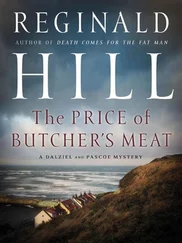Reginald Hill - Pictures of Perfection
Здесь есть возможность читать онлайн «Reginald Hill - Pictures of Perfection» — ознакомительный отрывок электронной книги совершенно бесплатно, а после прочтения отрывка купить полную версию. В некоторых случаях можно слушать аудио, скачать через торрент в формате fb2 и присутствует краткое содержание. Год выпуска: 1994, ISBN: 1994, Издательство: HarperCollins Publishers, Жанр: Полицейский детектив, на английском языке. Описание произведения, (предисловие) а так же отзывы посетителей доступны на портале библиотеки ЛибКат.
- Название:Pictures of Perfection
- Автор:
- Издательство:HarperCollins Publishers
- Жанр:
- Год:1994
- ISBN:9780007370313
- Рейтинг книги:5 / 5. Голосов: 1
-
Избранное:Добавить в избранное
- Отзывы:
-
Ваша оценка:
- 100
- 1
- 2
- 3
- 4
- 5
Pictures of Perfection: краткое содержание, описание и аннотация
Предлагаем к чтению аннотацию, описание, краткое содержание или предисловие (зависит от того, что написал сам автор книги «Pictures of Perfection»). Если вы не нашли необходимую информацию о книге — напишите в комментариях, мы постараемся отыскать её.
Pictures of Perfection — читать онлайн ознакомительный отрывок
Ниже представлен текст книги, разбитый по страницам. Система сохранения места последней прочитанной страницы, позволяет с удобством читать онлайн бесплатно книгу «Pictures of Perfection», без необходимости каждый раз заново искать на чём Вы остановились. Поставьте закладку, и сможете в любой момент перейти на страницу, на которой закончили чтение.
Интервал:
Закладка:
Reginald Hill
Pictures of Perfection
Volume the first
PROLOGUE BEING AN EXTRACT FROM THE DRAFT OF AN UNCOMPLETED
History of Enscombe Parish
BY THE REVEREND CHARLES FABIAN CAGE, D.D.(DECEASED)
It is a truth fairly universally acknowledged that all men are born equal, but the family Guillemard, pointing to the contra-evidence of their own absence from the Baronetage, have long been settled in Yorkshire without allowing such philosophical quibbles to distress or vex them.
The first stirrings of populism in the last century had been shrugged off as a mere Gallic infection, susceptible to applications of cold iron and a diet of bread and water. But the virus proved a virulent strain, eventually getting a firm grip on a country weak and convalescent after the Great War, and by the nineteen thirties even the Guillemards had begun to suspect its presence in their own Norman blood.
And by 1952 when Selwyn Guillemard, the present Squire, inherited the estate, he was ready to accept, without prejudice, that there might after all be something in this newfangled notion of the Rights of Man.
The Rights of Woman, however, remain very much a theme of science fiction.
About thirty years ago, Squire Selwyn had the ill luck to lose his only son and daughter-in-law in a motoring accident, a grievous loss and one which, despite all my urgings, he seemed more inclined to bear with pagan stoicism than Christian fortitude. Nor did he at this stage derive much consolation from the survival of his infant granddaughter who henceforth was brought up at Old Hall.
A child reared in an ageing household is likely to be either precocious or withdrawn and little Gertrude Guillemard showed few signs of precocity. Indeed, so quiet and self-effacing was she that even her antique name seemed too great a burden for her and it was soon alleviated to Girlie.
The Enscombe Old Hall estate is naturally entailed upon the male line. Modern law has rendered such archaic restrictions easily removed, but whichever way he looked, Squire Selwyn could see little incentive to change. Behind, he saw the sternly admonitory face of tradition; ahead, he foresaw that the diminished and diminishing estate was going to need a more vigorously heroic hand than his own to keep it from total collapse, and no one who had ever seen Girlie Guillemard in her infancy could have supposed her to be a heroine. So the Squire had few qualms about admitting his great-nephew, Guy, as heir apparent.
His wife, Edna, nursed hopes that the main and collateral lines might be joined by a marriage of cousins. These pious hopes survived their adolescence which saw Girlie mature into a self-contained and biddable young woman and Guy sprout into a bumptious self-confident public schoolboy, though a more perceptive woman than Edna Guillemard might have been rendered uneasy by the infrequency of Guy’s visits to Yorkshire (which he designated mega-boring) and the stoicism with which Girlie bore his absence. Then, shortly after the young folk reached their majorities and could decently be given some firm prothalamic nudges, tragedy struck the Guillemards again, and Edna died of a too tardily diagnosed adder bite. Once more I officiated at a Guillemard funeral.
Afterwards the Squire invited me to join himself and the youngsters in his study for a glass of sherry. We talked for a while, as one does, of the virtues of the dear departed, then the Squire took a huge meerschaum from his crowded pipe rack, slowly filled and lit it, and seemed to go into a reverie with his eyes fixed on the furthermost left-hand corner of the room. Finally he nodded, turned his attention to me, and said, ‘Edna had a fancy to see these yonkers in church again pretty soon, getting married. What do you think?’
‘More to the point, what do they think?’ I replied.
Now Guy too produced a pipe, all gleaming with stainless steel, pulled the tobacco jar towards him and went through a similarly lengthy filling and lighting process before saying, ‘I think I’m a bit young yet to be thinking of marriage, Squire. But a few years on, who knows? In the meantime, I’m happy to admit some kind of gentleman’s understanding.’
Then he sat back in his chair, smiling complacently, I presume at what he took to be his diplomatic dexterity.
The Squire looked at Girlie. Slowly she reached forward and took a smaller meerschaum from the rack. Slowly she filled it from the jar, slowly she lit it. Satisfied, at last she sat back in her chair and took two or three appreciative puffs. Finally she spoke.
‘As for me,’ she said, ‘I’d rather screw a rabid porcupine. Now if you’ll excuse me, I have to see about lunch.’
When she left she took the pipe with her. What had been a gesture became first a symbol, then, alas, an addiction. There were other changes too. All the Laura Ashley dresses her grandmother thought so became her were discarded (though not destroyed, many of them reappearing a short while later when little Frances Harding came to live at the Hall) and Girlie took to wearing jeans and wellies during the working day, and stark black and white for formal occasions. Her Alice-length hair was reduced to a helmet of turbulent curls, and very soon the great local debate about who would now run the household was rendered superfluous as it became apparent that Old Hall had a new and formidable chatelaine.
The estate was managed by a factor under the notional supervision of the Squire, but the latter, never the same since the loss of his son, now retreated even further into a protective eccentricity. The task of checking the books soon devolved upon Girlie. These were the insane ’eighties when the psycho patients took over the surgery and started remodelling society in their own image of perfection, without benefit of anaesthetic. Trevor Hookey, the factor, soon revealed himself as a dedicated Thatcherite, wielding his knife with a zealot’s glee, crying, ‘If it doesn’t hurt, it’s not working!’ and assuring Girlie proudly that the new sleek and slimline Old Hall estate was the super-efficient model of the future.
Girlie listened politely to this liturgical formulary for a couple of years. Then as her calculator squeaked up the dismal ‘grand’ total at the annual Reckoning of 1986, she interrupted the zealot, saying, ‘Enough. I have seen the future and it sucks. We aren’t sleek and super-efficient, we’re emaciated and moribund. There’s only one large economy left for us to make.’
‘And what’s that, my dear?’ asked Hookey with a patronizing air.
‘Your salary,’ said Girlie Guillemard.
These Reckonings, by the way, take place on Lady Day, that is the Feast of the Annunciation, March 25th, which is in England a Quarter Day, and has in Enscombe since time immemorial, or at least since 1716, been the day for the settling of accounts. That it survives as an occasion is a tribute to Yorkshire doggedness. Naturally the largest and most general payments to be made in the area are the Squire’s rents, and while the Guillemard estate was still extensive and ways were rough, it was common courtesy to offer the tenants some refreshment before they set off home.
But over the years, even before the awful ’eighties, the estate was contracting and roads were improving, and gold coin under the floorboards was giving way to paper money in the bank, and eventually cheques and giros and standing orders made it hardly necessary for the physical collection of rents at all. In any other county, The Reckoning would have ceased to exist save in the memory of greybeards and the annals of antiquarians. But the difficulty of prising a Yorkshire terrier’s teeth from the neck of a rat is as nothing to that of persuading a Yorkshire tyke to give up a long-established freebie. So The Reckoning has evolved into an annual bun-fight at which the collection of rents occupies only a couple of minutes, and the refreshment and gossip a couple of hours.
Читать дальшеИнтервал:
Закладка:
Похожие книги на «Pictures of Perfection»
Представляем Вашему вниманию похожие книги на «Pictures of Perfection» списком для выбора. Мы отобрали схожую по названию и смыслу литературу в надежде предоставить читателям больше вариантов отыскать новые, интересные, ещё непрочитанные произведения.
Обсуждение, отзывы о книге «Pictures of Perfection» и просто собственные мнения читателей. Оставьте ваши комментарии, напишите, что Вы думаете о произведении, его смысле или главных героях. Укажите что конкретно понравилось, а что нет, и почему Вы так считаете.












